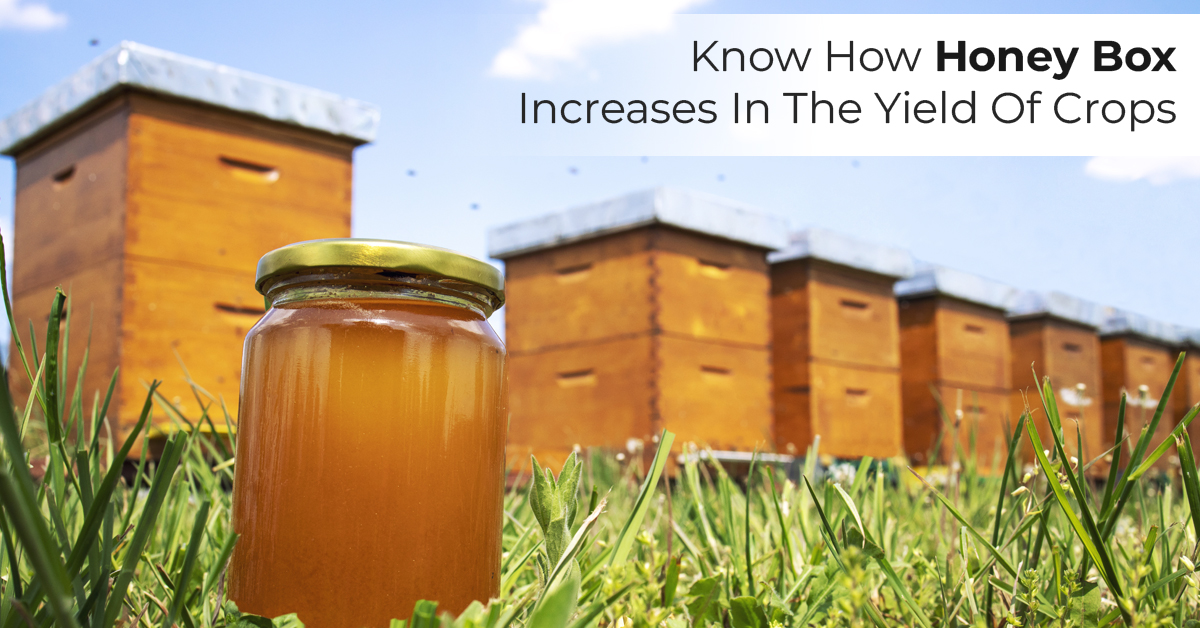Do you know that honey boxes help in higher yield of crop production? If not, then this blog is for you. Honey boxes play a crucial role in the crop yield through cross pollination. So, when bees collect nectar from the flowers, they unknowingly transfer the pollen while shifting from one flower to another. Hence, this action by the bees facilitates fruit formation and fertilization for various species. Therefore, by strategically placing these honey bees within the farms, we at Annam Milk, one of the best suppliers of organic milk in Chennai, support a healthy bee population ensuring the pollination helps a lot in the pollination. We believe that placing honey boxes within the field enhances the pollination efficiency, increasing the production of fruits, crop’s quality, and uniformity. Let's briefly know how honey boxes increase the yield of crops effectively by reading the blog below.
Understanding Honey Boxes:
Before exploring how honey bee boxes help in crop production, we will know what honey bee box means. The honey bee boxes are also called pollinator hives or bee boxes, which have an artificial structure that primarily attracts the honey bees within the farm. These boxes are not similar to nature bee hives but still have the conditions that are perfect for bees to thrive. One more essential thing while placing these honey boxes is the strategic placement of these boxes within the farm as it determines the reproduction process and yields unique plant species.
The Mechanism Of Pollination:
The primary mechanism of the pollination is where the pollen grains are transferred from the anthers (male reproductive organ of flowers) to stigma (female reproductive organ of flowers). This mechanism is essential for the plant's fertilizations, as they lead to formation of seeds and fruits, yielding higher crop production. However, the pollination happens through the pollinators such as bees, butterflies, birds, and moths as they carry the pollen grain from one flower to another in search of nectar.
Enhancing Pollination Efficiency:
Honey boxes function as hubs for pollinators, attracting a diverse range of bee species to agricultural landscapes. By increasing the population and activity of pollinators within crop fields, honey boxes enhance pollination efficiency. This results in more thorough pollen transfer between flowers, improving fruit set, uniformity, and, ultimately, higher crop yields.
Diversity Of Pollinators:
While honey bees are the most commonly recognized pollinators, honey boxes attract a variety of bee species, including solitary bees, bumblebees, and native bees. Each species has unique characteristics and behaviors that contribute to pollination differently. By fostering a diverse community of pollinators, honey boxes ensure comprehensive pollination coverage across various crops, mitigating the risks associated with reliance on a single pollinator species.
Mitigating Pollinator Decline:
In recent years, the decline in pollinator populations, attributed to habitat loss, pesticide use, and climate change, has raised concerns about its detrimental impact on agriculture. Honey boxes serve as sanctuaries for pollinators, offering refuge and sustenance amidst increasingly challenging environments. By providing supplemental resources and nesting sites, honey boxes support pollinator populations, safeguarding pollination services essential for crop production.
Integration With Sustainable Farming Practices:
Honey boxes align with sustainable agriculture principles by promoting ecological balance and biodiversity within farming systems. Unlike conventional pollination methods that rely heavily on managed honey bee colonies, honey boxes harness the innate capabilities of native pollinators, reducing dependence on external inputs. Furthermore, by encouraging natural pollination processes, honey boxes minimize the need for synthetic fertilizers and pesticides, fostering healthier ecosystems and reducing environmental impacts.
Synergies With Agroecological Approaches:
Integrating honey boxes into agroecological frameworks enhances the resilience and productivity of agricultural systems. Agroecology emphasizes the harmonious interaction between ecological processes and agricultural activities, aiming to optimize yields while preserving natural resources and enhancing ecosystem services. Honey boxes contribute to this holistic approach by enhancing biodiversity, promoting soil health, and improving crop resilience to pests and diseases.
In the face of mounting challenges posed by climate change, habitat degradation, and food security concerns, innovative solutions like honey boxes offer promising avenues for sustainable agricultural development. By harnessing the natural power of pollinators, honey boxes amplify crop yields, promote biodiversity, and foster resilient farming systems. As we strive towards a more sustainable and equitable future, Annam Milk the best provider of organic fresh cow milk in Chennai embraces these practices synergizing with nature leading to maximized yields and overall productivity and sustainability.




